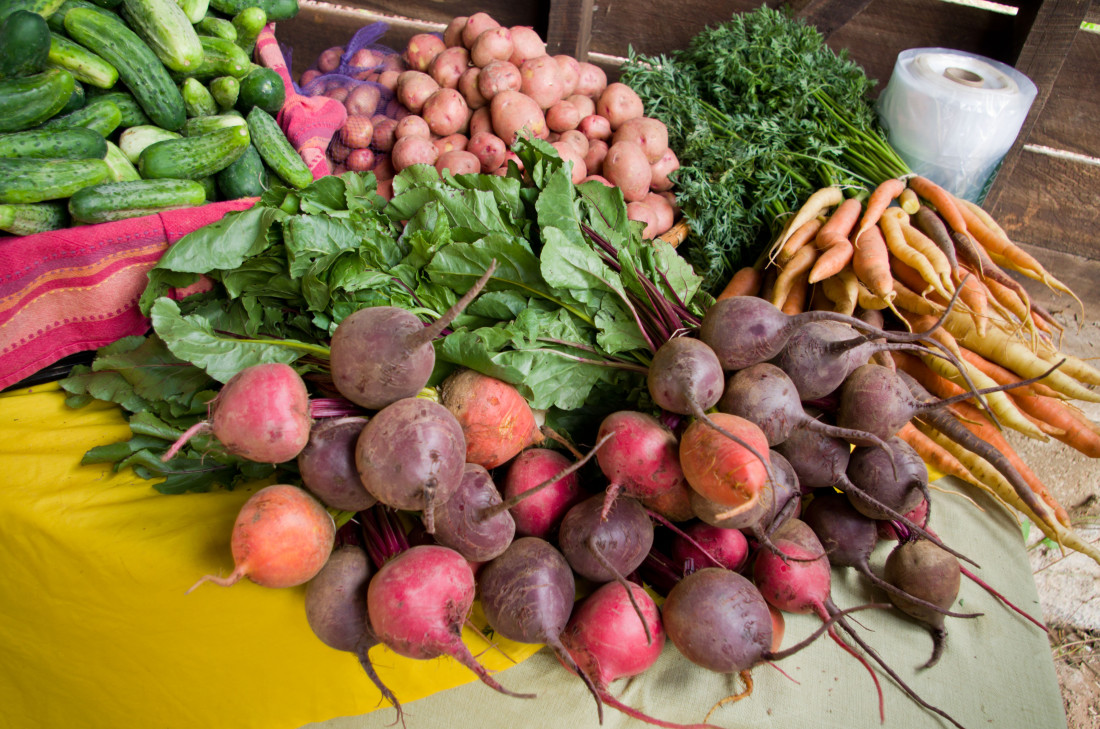Asheville’s a food town. Whether it’s our nationally acclaimed restaurant scene, our farm-to-table focus or our farmers market-driven lifestyles, the love of quality food and drink has helped put this city on the map. Indeed, the Asheville Convention and Visitors Bureau went so far as to trademark the term “Foodtopia.” So when a 2010 Tyson Foods survey ranked North Carolina as the second most food-insecure state in the nation, and another survey labeled Asheville the sixth-worst U.S. metropolitan area, community organizers, local activists, farmers, business owners and even Asheville City Council teamed up to tackle the problem (see “Hidden in Plain Sight: Asheville’s Food Deserts,” Dec. 30, 2014, Xpress).
Established in 2011, the Asheville-Buncombe Food Policy Council aims to influence policy and support programs and institutions working to solve Asheville’s hunger issues. A limited grant enabled the council to hire its first coordinator, Mary Ellen Lough, in June, but the council still operates primarily with volunteers from the community. Since March, Xpress has been embedded with the group; here’s a look at what they’re up to.
“Asheville and Buncombe County,” explains food council member Nicole Hinebaugh, needed a “collaborative organization that allowed anyone to be a part of it, that could enact real change at the local policy level, while … allowing the members to be involved in the areas of their own interests and expertise.
“We worked with the city of Asheville,” continues Hinebaugh, program director of Asheville’s Bountiful Cities, “to develop the Food Action Plan, which was adopted by the city a couple of years ago. It’s a list of commitments the city is making to improve food access within our communities. One of the big things the Food Policy Council does is to hold the city accountable for its commitments.”
Within the council, smaller “clusters” focus on particular aspects of local food policy. The makeup can change depending on which volunteers are available, but currently there are six clusters, covering health and education, land use, access, policy mobilization, farmer support and water.
“The access cluster,” for example, considers ways to “identify the barriers associated with lack of access to food, address those barriers, fill in the gaps and recommend policy change,” says Hinebaugh. Current initiatives include supporting the continued development of Ujamaa Freedom Market, a worker-owned mobile business delivering farm-fresh foods, and Just Economics’ transportation campaign, which aims to expand mass transit and give users a greater voice in transportation decisions. The support might take the form of grant applications, shared expertise or helping participants get additional training.
“The Food Policy Council really isn’t here to develop new programs,” Hinebaugh explains. “We’re not a 501(c)(3) nonprofit; we’re mostly about supporting existing initiatives and making policy recommendations.”
One big obstacle to developing effective policies has been the lack of pertinent regional data. Several city council members (including Gordon Smith, one of the food group’s initial organizers) have called for a system of metrics to gauge the group’s progress.
Accordingly, the policy council is partnering with UNC Asheville professor Ameena Batada to create a service learning program enlisting 12-15 of her students to track data and lay the groundwork for developing an appropriate food policy. The initiative “designates 20 hours per student, per semester, to service learning,” explains recent UNCA graduate Ashley Heger, who was hired to help develop the program. “This isn’t just going out to a garden and raking leaves or cleaning up property: This is a form of community service that directly reflects the curriculum.”
Although MANNA FoodBank, notes Heger, knows exactly how many boxes of food it’s distributed to community members, those metrics are harder to establish for things like community gardens and farms. “A farm can say, ‘We produced so many bushels of produce a day,’ but then it’s a matter of how many meals that produced. Who did it feed?” A larger goal, she continues, is creating “metrics that will enable us to apply for grants. How do we track equitable resource distribution, including food and water and access to them, and then look at that in a policy-based way?”
The students, adds Hinebaugh, will sift the available research and feed pertinent information to the food group. “So much out there has already been studied; this is about giving us access to that information,” she explains.
“The Food Policy Council really depends on community members and their involvement in order to function,” stresses Hinebaugh, encouraging interested members of the public to attend the group’s annual Meeting of the Whole on Friday, July 31. “The more people that know about us and know what we’re doing, the stronger we can be.”
The Asheville-Buncombe Food Policy Council’s Meeting of the Whole happens 6-9 p.m. Friday, July 31, at the Stephens-Lee Recreation Center off South Charlotte Street. Interested members of the community are encouraged to attend. RSVP by Saturday, July 26.




Before you comment
The comments section is here to provide a platform for civil dialogue on the issues we face together as a local community. Xpress is committed to offering this platform for all voices, but when the tone of the discussion gets nasty or strays off topic, we believe many people choose not to participate. Xpress editors are determined to moderate comments to ensure a constructive interchange is maintained. All comments judged not to be in keeping with the spirit of civil discourse will be removed and repeat violators will be banned. See here for our terms of service. Thank you for being part of this effort to promote respectful discussion.